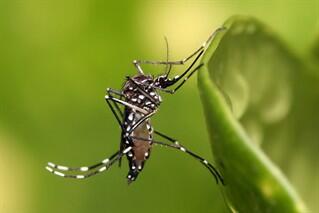
LSTM’s Seminar Series continued this week with a presentation by Dr Ferdinand V. Salazar, Head of Dept. of Medical Entomology, Research Institute for Tropical Medicine (DOH), The Philippines. His talk, entitled: Operationalization of insecticide resistance monitoring in disease vectors in the Republic of the Philippines, was introduced by LSTM’s Dr Mike Coleman.
Dr Salazar began by explaining that it was in the 1960s that they started to see documented cases of resistance to the cyclodiene class of insecticides, at this stage it was mainly in the Aedes albopictus mosquito, which is a vector for dengue fever, but also in some anopheles msoquitoes. He looked at the national programme of vector control across the islands, which uses indoor residual spraying (IRS) and long-lasting insecticidal nets (LLIN). He explained that not all provinces have malaria, but in the areas using LLINs there is about 71% coverage.
In order to monitor resistance in vectors of both dengue fever and malaria, sentinel sites have been set up.The most dominant vector for malaria is the anopheles flavirostris and these were collected using baited traps and identified back in the lab. The first target was to establish discriminating doses for local vectors and he explained how they carried out baseline susceptibility tests using alpha cypermethrin on mosquitoes collected in different sentinel sites, which was then repeated 12 months later.
Reverting back to WHO standard testing they found that those collected from most sites were still susceptible to pyrethroids and they carried out toxicity comparisons to see which would kill most mosquitoes. Dr Salazar went on to talk about how insect susceptibility might also be dependent on agricultural factors, particularly as there appears to be higher resistance in populations collected in agricultural areas. If the same active ingredients are used in both public health and agricultural insecticides then that may cause selection pressure and might encourage resistance.
Dr Salazar concluded his seminr by showing that while most of the collected anopheles flavirostris, the malaria vectors, are still susceptible to pyrethroids, dengue vectors aedes aegypti which were collected using ovitraps, were in fact resistant to all pyrethroids except malathion.